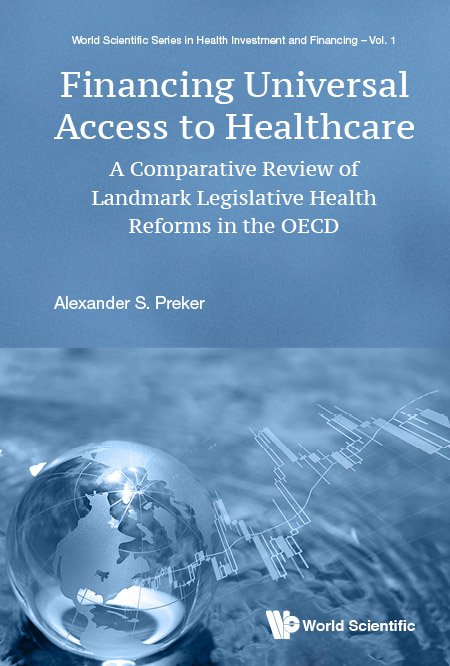The recent expansion of health insurance coverage in the USA under the Affordable Health Care Act, and current threats to reverse the benefits of this reform, have once again focused the world's attention on the difficult challenges faced by other countries trying to provide better access to healthcare to their population at an affordable cost. This textbook provides a comparative review of financing universal access to healthcare in the Organisation for Economic Co-operation and Development (OECD) countries.
The first two chapters of the book provide a framework for financing universal access to healthcare. The remaining eight chapters present case studies of eight OECD countries that have successfully introduced reforms to finance universal access to healthcare for their population through landmark legislative reforms. A concluding chapter focuses on the lessons learned from the OECD and recommendations from policymakers and others who are planning similar reforms. The book is designed as a learning tool for students and as a user guide for policymakers.
Sample Chapter(s)
Part 1: Introduction (79 KB)
Contents:
- Introduction:
- Analytical Framework
- Methodology
- National Profiles:
- New Zealand
- United Kingdom
- Canada
- Australia
- Denmark
- Norway
- Sweden
- Finland
- Discussion:
- Analysis
- Performance Evaluation
- Lessons Learned
Readership: Graduate and research-level students and instructors of healthcare financing, healthcare policymakers, and healthcare professionals and investors.
"The International Hospital Federation (IHF) is committed to advancing the UHC agenda throughout the world, giving billions of people better access to critical hospital care and basic health services when needed, no matter their income or geographic location in the world. Since its establishment in 1929, the IHF recognizes the essential role of hospitals and health care organizations in providing health care, supporting health services and offering education to health care providers as a critical partner in during the drive for UHC throughout the world. This volume is a tribute to the renewed effort in achieving 'Health for All'."
Eric De Roodenbeke
Executive Director
International Hospital Federation
Geneva, 2018
"This year, as we commemorate the 40th Anniversary of the Alma-Ata Declaration of 'Health for All' in Almaty, Kazakhstan, 1978 and the 70th Anniversary of the UK National Health Service, 1948, we also celebrate the great achievement over the past decades in bringing access to affordable and quality health care for billions of people across the world since the 1950s. Looking forward, at the recent Universal Health Coverage Forum 2017 in Tokyo, Japan, the international development community — including both bi-laterals and multi-laterals — committed to the 'Tokyo Declaration on Universal Health Coverage: All Together to Accelerate Progress towards UHC'. This text book makes a valuable contribution by reviewing the political, policy and implementation challenges that countries face in achieving this agenda. The approach used to analyze the eight case studies presented in the volume is a seminal work in comparative health policy."
James Christopher Lovelace
International Health and Development Advisor
Former Director, Health Nutrition and Population, World Bank
Former Assistant Deputy Minister of Health, Government of BC, Canada
Former Director General of Health, Government of New Zealand
Alexander S Preker is a globally recognized expert on health systems development and health policy reform. He has been an advisor to the Ministers of Health and senior policy makers in countries throughout the world on capital investment in the health sector, health financing, health insurance, public-private partnerships and the political process of healthcare reform.
Currently, Professor Preker is an Executive Scholar and Adjunct Associate Professor at Columbia University, New York University and the Icahn School of Medicine at Mt. Sinai in New York. He is a Commissioner with the Global Commission on Pollution, Health and Development, an Honorary Associate member of the International Hospital Federation and Member of the Board for the USA Health Alliance. He is an active supporter of new developments in life sciences and medical technology as President and CEO of the Health Investment & Financing Corporation, as a Founding Member of the New York Chapter of the Keiretsu Forum and Keiretsu Capital and through other investment activities.
Previous to his current work, Professor Preker had a long career with the World Bank Group. He was Chief Economist for the health sector and Head of the Health Industry Group and Investment Policy for the International Finance Corporation (IFC).
Professor Preker has published extensively, having written many scientific articles and editorials, and having authored over 15 books. He was a member of the Editorial Board of the World Bank's Publication Department and Editor in Chief of its Health, Nutrition and Population publications. Currently, he chairs the External Advisory Committee for the World Hospitals and Health Services Journal of the International Hospital Federation, and is the Editor in Chief of the Health Investment and Financing Series of World Scientific.
Professor Preker's training includes a PhD in Economics from the London School of Economics and Political Science, a Fellowship in Medicine from University College London, a Diploma in Medical Law and Ethics from King's College London, and a MD from University of British Columbia/McGill.
























